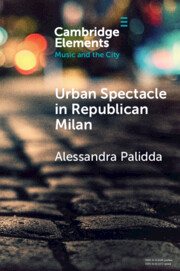Refine search
Actions for selected content:
2 results
9 - The Directory, Thermidor, and the Transformation of the Revolution
- from Part I - France
-
-
- Book:
- The Cambridge History of the Age of Atlantic Revolutions
- Published online:
- 18 October 2023
- Print publication:
- 09 November 2023, pp 247-271
-
- Chapter
- Export citation

Urban Spectacle in Republican Milan
- Pubbliche feste at the Turn of the Nineteenth Century
-
- Published online:
- 09 August 2023
- Print publication:
- 31 August 2023
-
- Element
- Export citation
